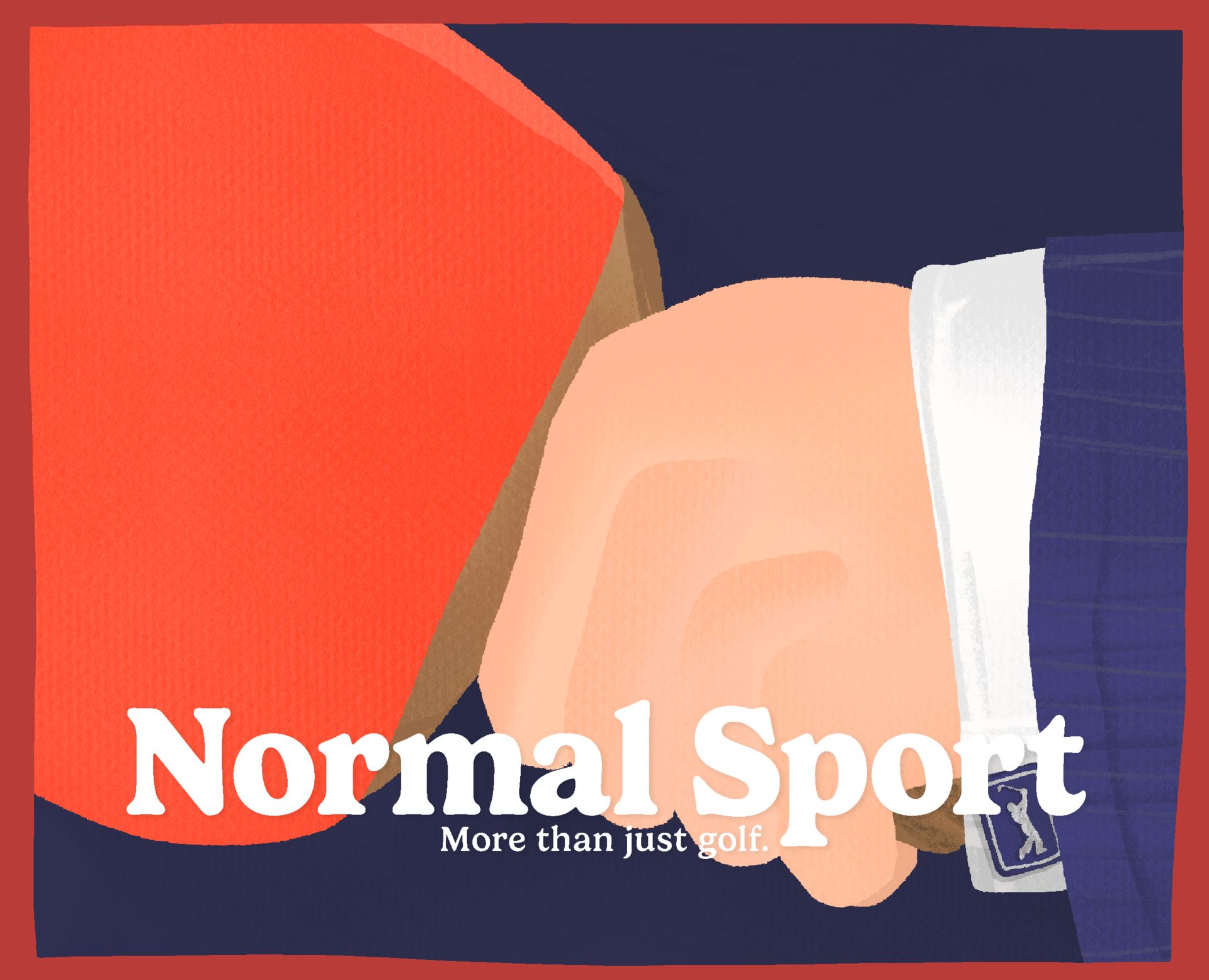
Well, well, well.
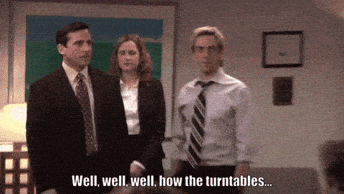
Brooks Koepka is back. Brian Rolapp has a signature moment of his own not even six months into the job and a man that once consumed six or seven (six-seven) protein shakes a day now holds the future of men’s professional golf in his hands.
We have a lot to discuss.
Name drops today: Talor Gooch, Tiger Woods, Kevin Na, Austin Eckroat (twice!) and the shame-shame-shame woman from Game of Thrones.
Today’s newsletter is sponsored by OGIO.
Many are saying the PGA Tour has gone soft by letting a certain five-time major champion back in the mix with little to no punishment.
Actually nobody is saying this except for mid-tier players who not only have no effect on the needle but don’t even know where it’s located.
What has gone soft in recent years, though, is hardside luggage, which is a problem OGIO is attempting to solve with their new Renegade travel collection. Jason and I have the checked bag and carry on, respectively, and they are legitimately the best suitcases we’ve ever owned. Check them out here.
Last year we traveled the world with our OGIO fleet and we’re pumped that they have our backs (and stuff) again this year.
OK, now onto the news.
1. Brian Rolapp with this decision …
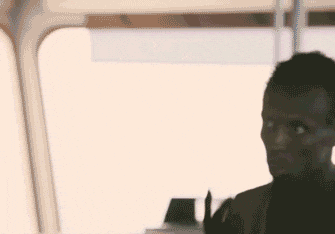
This move was about Brooks and the strength of the PGA Tour, sure, but it also reeks of Rolapp establishing himself as a true power broker at the top of the Tour hierarchy.
From the time Brooks notified the Tour he was leaving LIV, it took 20 days for Rolapp and Co. to build (or finish building), implement and announce the re-entry program for him and others like him who may return.
It would have taken previous versions of the PGA Tour 20 months to do all of this.
2. Messaging was clear to both players and fans. This feels good!
First by Rolapp in a letter to players.
We recognize there may be questions about how this policy holds a returning player accountable, especially after earning substantial compensation elsewhere. Ultimately, by accepting membership in the Returning Member category, Brooks is making the decision to return to the PGA Tour now—something our fans want, and something that strengthens both the game and our organization.
Brian Rolapp to players
Again, not a lot of room to hear out the Tour’s members. Just … this is what we’re doing, sorry not sorry. Which is how things should operate (as long as the actual operator is good). Joel Beall detailed here how Rolapp worked the room and informed the power players involved. This is speculation, but I do think the seeming bromance between Tiger and Rolapp (which I wrote about a bit here) is extremely helpful for the Tour’s new CEO.
Rolapp then wrote to fans.
I’ve been fortunate to hear and learn from so many of our fans on what makes the PGA Tour special, along with the ways we can further enhance the drama and consequence of competing at the highest level of the game. And one thing has been clear across each of those conversations — you all want the best players in the world competing against each other more often.
On Dec. 23, 2025, Brooks Koepka notified the PGA Tour that his previous affiliation had concluded, and he subsequently applied for reinstatement of Tour membership. This prompted our boards to evaluate how we deliver the best version of the PGA Tour for our fans, players and partners — with severe and justified consequences — which has resulted in our new Returning Member Program.
Brian Rolapp to fans
The through line here is Rolapp giving fans what they want and doing so in a way that solidifies the above, “I’m the captain now” GIF. It legitimately comes off as a fan first decision and a version of what basically all of us who follow men’s pro golf think we would have done if we were in Rolapp’s shoes.
Example text from a friend …
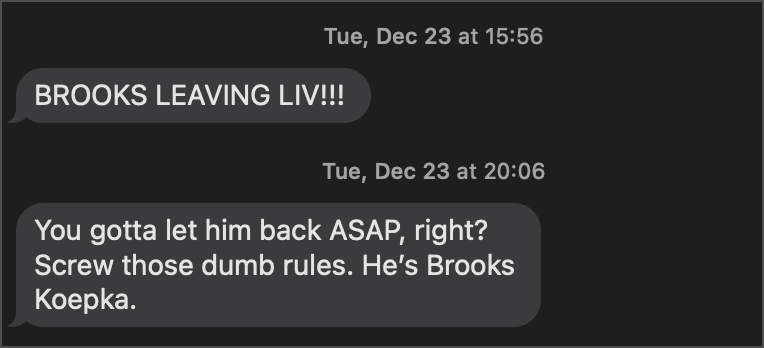
3. Brooks is a champion. This whole thing was a sham.
Here’s what I wrote when Brooks left.
Deep down it has to destroy Koepka, to be called to the dais with [guys] he doesn't believe are even in his universe and pretend like they're chummy and can't wait to barnstorm the globe together in this exhibition league.
Brooks is different than most of the rest of these guys. DJ's a mega talent who ran into some majors. Reed picked one off with the week of his life. Koepka is a champion -- one of the greatest in the history of the sport. A Phil of his era.
And the through line with Phil and Koepka is very clear: shame. These are men who always claimed (and actually believed!) that being a champion was all that mattered, and part of them can't believe their pride actually had a price.
Brooks knows what he did and he knows why he did it. And it can’t be easy to reconcile the person who would make this choice with the person you’ve always purported yourself to be.
Me
I actually give Brooks a lot of credit for swallowing whatever was left of his pride, giving up whatever was left of his contract and agreeing to a $5 million charitable donation to come back and grind on the PGA Tour.
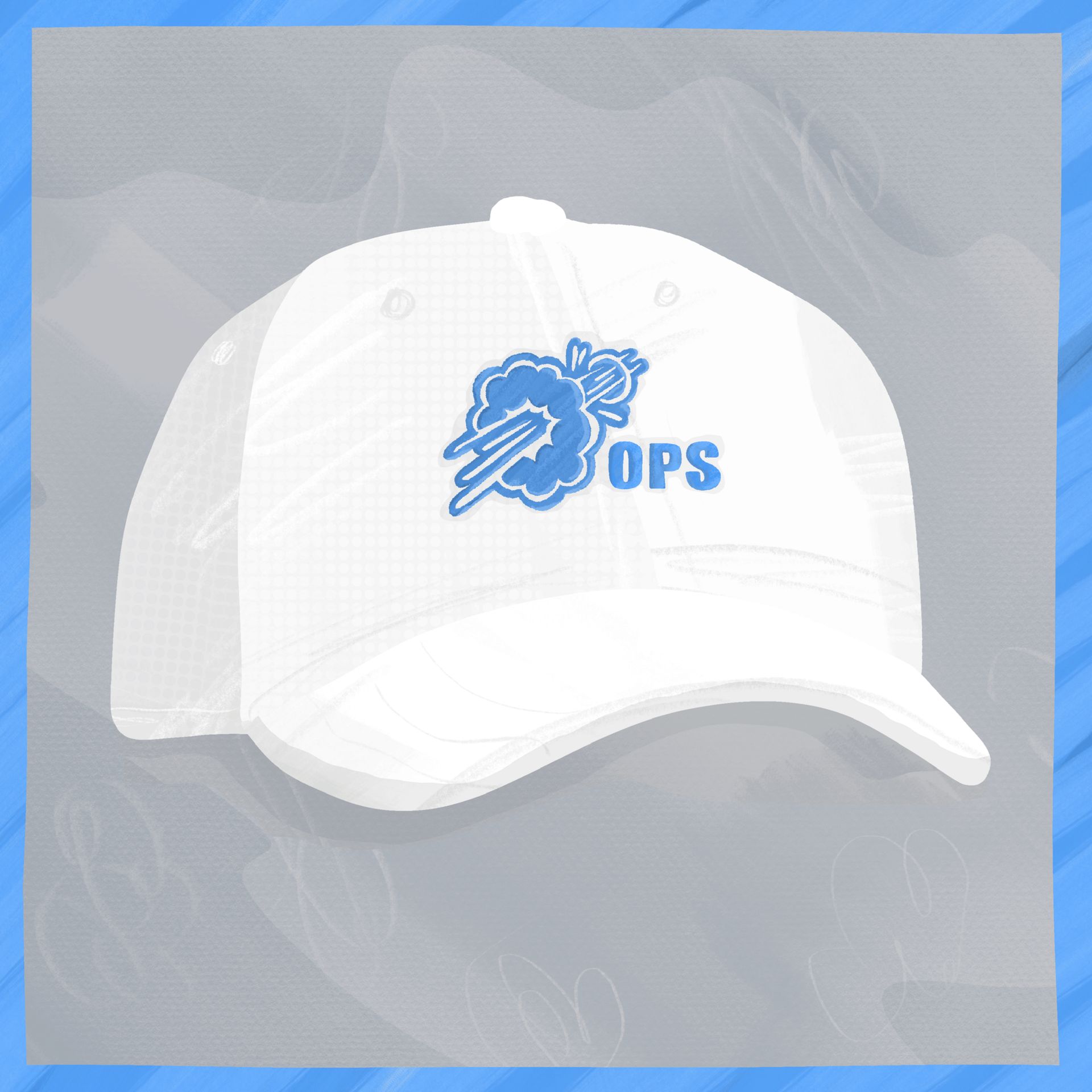
Brooks (obviously?) loves and cares about money, so none of that must have been easy. And while there will always be a scarlet letter to some degree, the default here is inertia, and it would have been much easier to stay with Smash and keep cashing those checks.
Related: How much must he have hated LIV for all of this to happen? To admit that he was wrong and kick away that monstrous contract all to be guaranteed … absolutely nothing on the PGA Tour?
Also related: LIV was the exact kind of thing somebody like Brooks would have endlessly mocked if he hadn’t joined it.
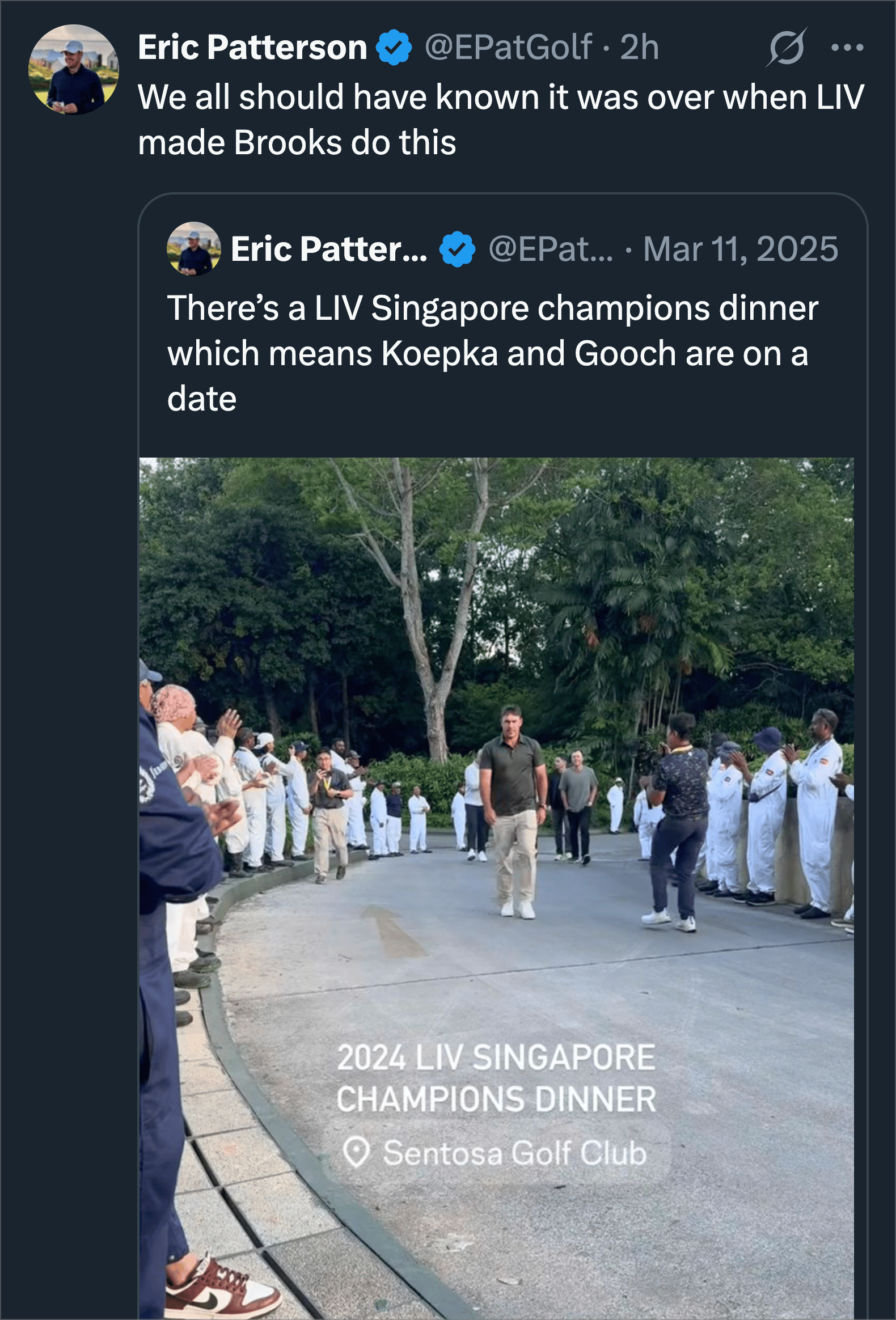
4. All of the Bryson outcomes are hilarious.
One of the following is going to happen …
Brooks just made Bryson the richest golfer of all time.
Bryson is going to end LIV by re-joining the PGA Tour.
Bryson is going to shun both and start hunting Mr. Beast’s YouTube subscriber count.
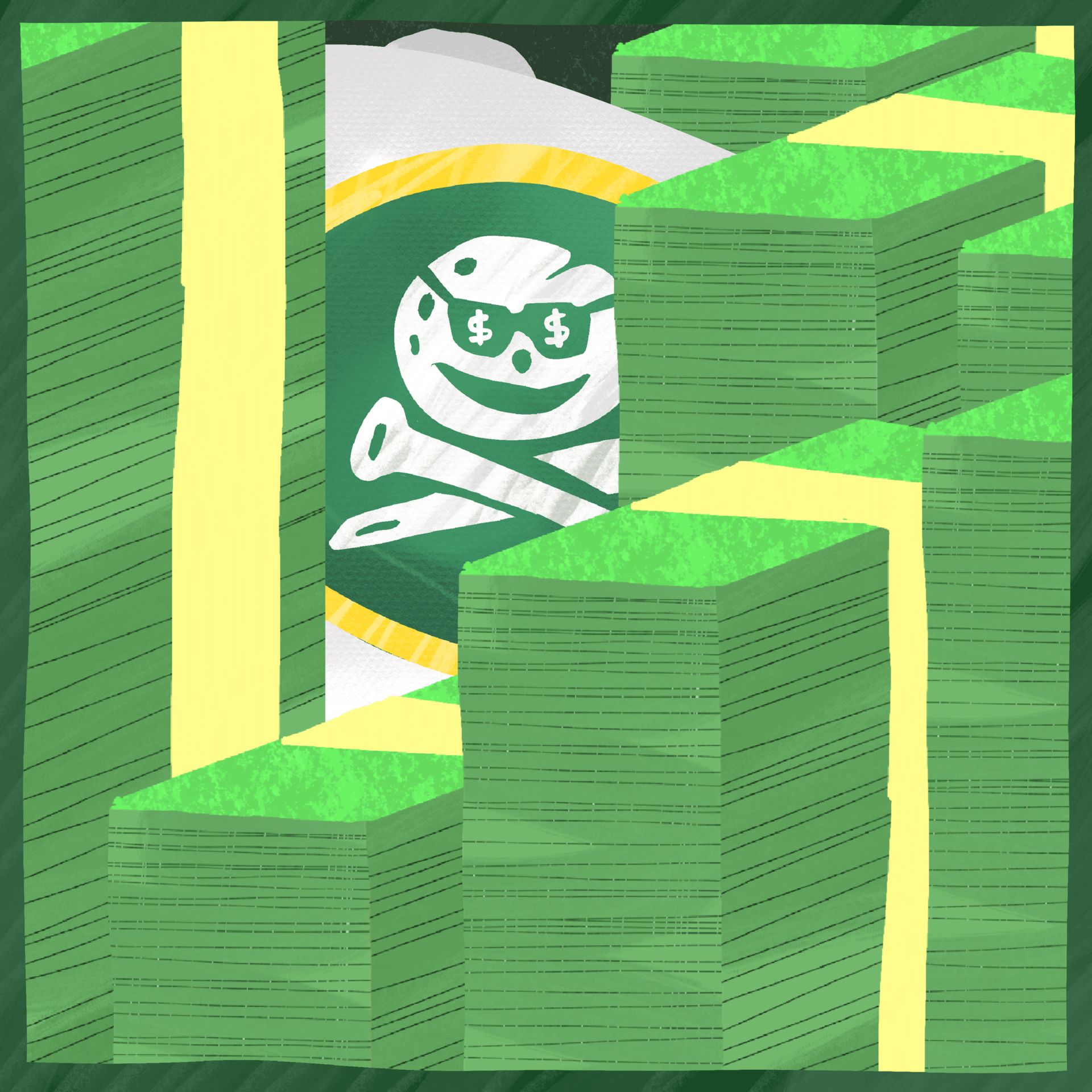
There is no Bryson outcome here that does not make me laugh. Because now, Bryson has “Elin Nordegren after the fire hydrant incident” levels of leverage. He doesn’t care about the PGA Tour. He (probably) doesn’t care about LIV.
He has a backup that may pay more than either. LIV is one defection away from being The Not-In-The-United-States Champions Tour.
Bryson calling Scott O’Neill right now …

5. If Bryson and Rahm leave, is that the end of LIV? I mean, the obvious answer is yes. But I think LIV is so hellbent on replacing the Euro Tour as the global game of record that it actually might not be the end of LIV.
Two things stand out about their response.
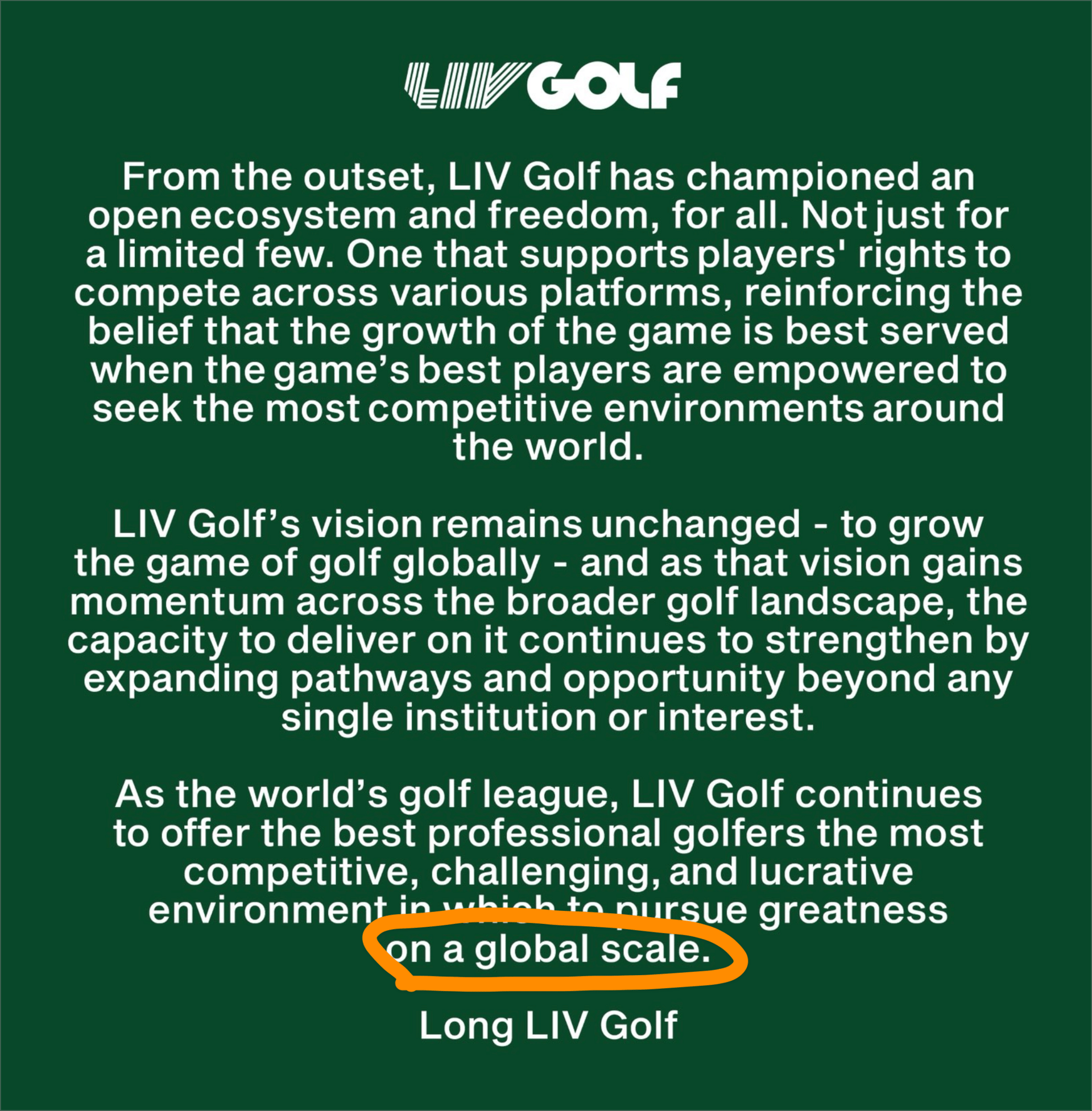
The first. In addition to a petty copying of what the PGA Tour wrote recently and adding “on a global scale” to it (which I love!), I think this signals that they do see a legit opening where the PGA Tour is vulnerable (taking on golf global) and want to capitalize on it. This is totally fair, if a bit misguided.
They followed this response quickly with an Iron Heads rebrand (can’t believe that’s a real sentence) to the Korean Golf Club, which I think furthers the point.
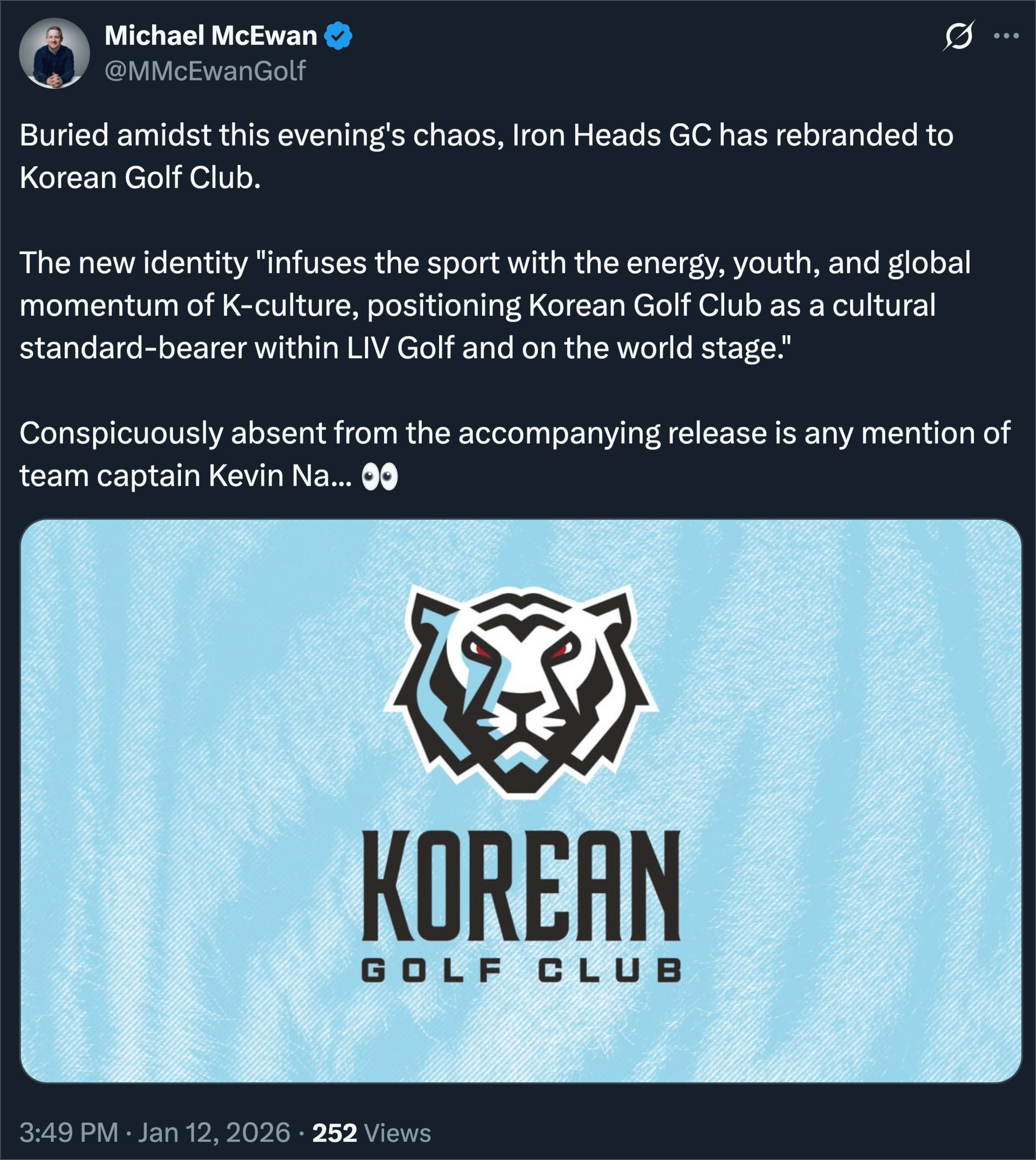
All of this makes sense to me from a business perspective. Truly.
The problem is that they tried to microwave the whole thing by using Bryson, Brooks, Phil and DJ instead of slowly building momentum over a long period of time. Companies don’t get microwaved into success, and LIV is not going to break that trend.
Instead, it has received $2+ billion from the PIF since the start of 2024 and basically traded Brooks Koepka for Adrian Meronk and Tyrrell Hatton in the process.
Oh, and it has not received OWGR points and has made almost no inroads in a market it clearly covets (the U.S.).
Obviously there could be a million other reasons for starting LIV, but from a pure business perspective it has been an abject failure.
The Tour has been criticized for not having enough adults in the room at times, but they look like a special forces mission control compared to whatever this is.
Despite all of this, I think it would probably continue pressing on even if Rahm and Bryson left, at least for a couple of years.
This post will continue below for Normal Club members and includes some Phil (and Tiger) thoughts, whether Brooks is even still good at golf and an ode to the five-time major winner who makes me think almost as much as the other five-time major winner.
Normal Sport is supported by exactly 1,020 crazed individuals. By becoming a member, you will receive the following …
• A vote for trusted, independent media.
• The delight of helping us establish Normal Sport.
• 15% off to our pro shop.
• Access to all of our content (like the rest of this post).
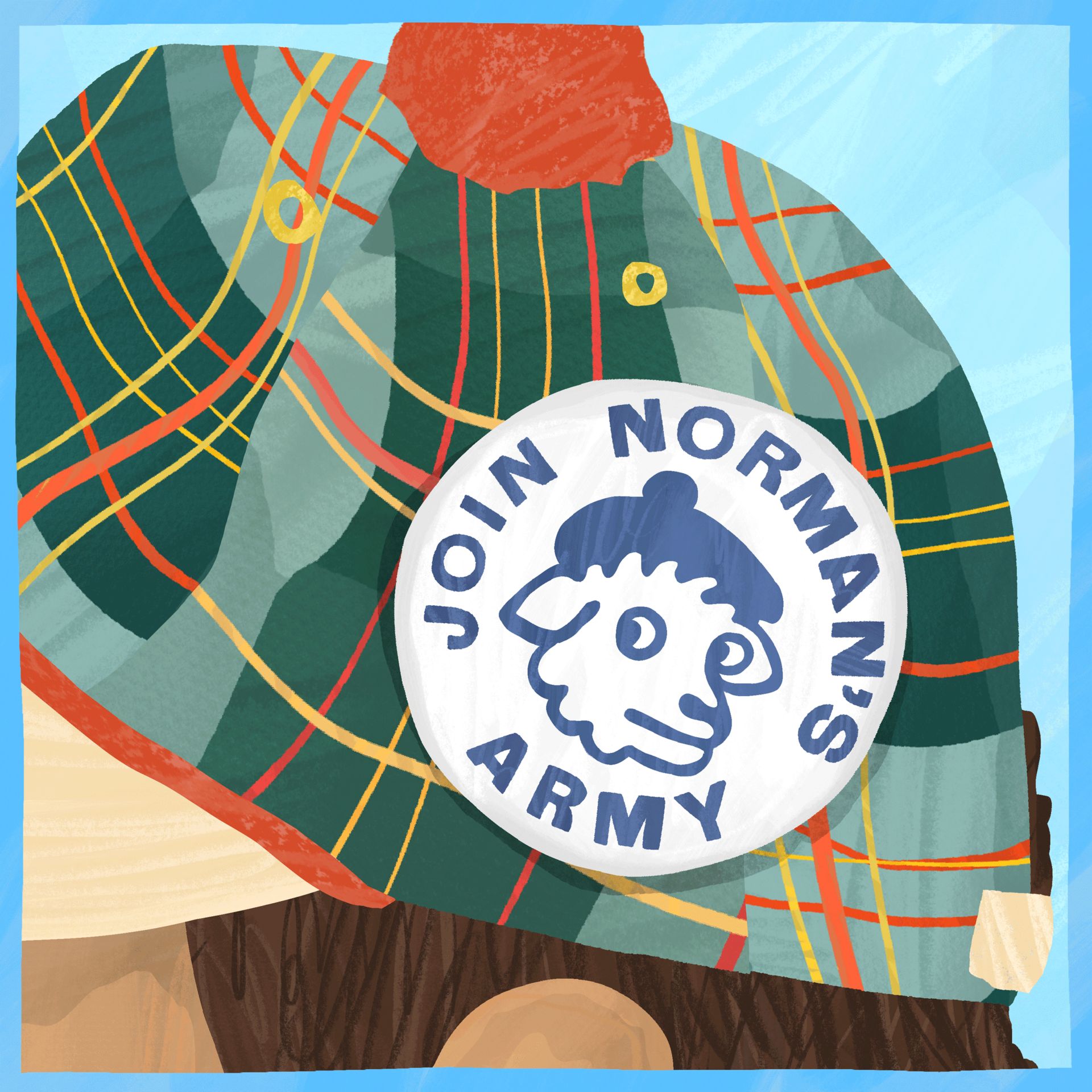
Welcome to the members-only portion of today’s newsletter. I love writing these “whoa, I can’t believe that happened!” 10 thoughts as much as anything I get to write. Hope you enjoy.
6. I found this to be an excellent point by Soly.
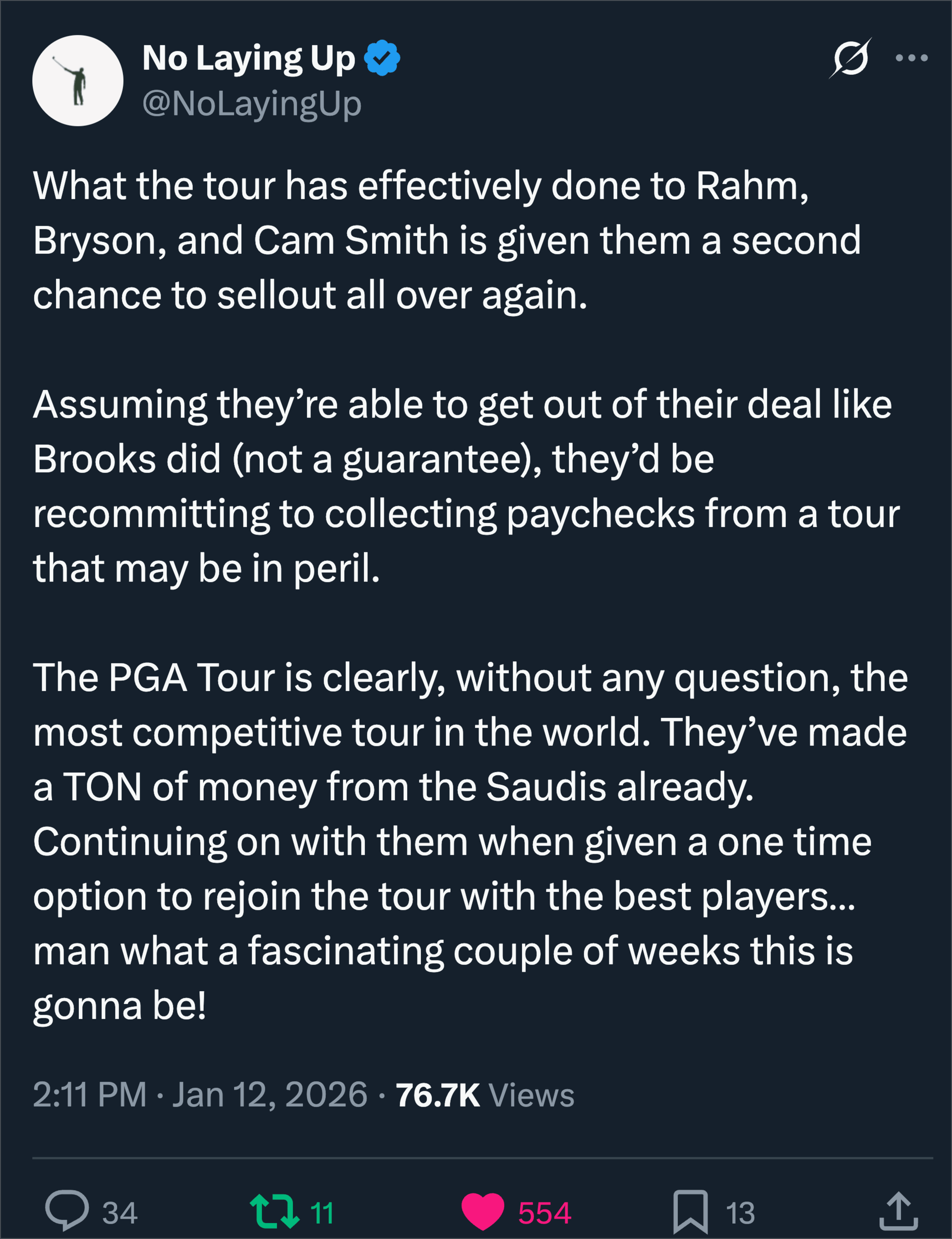
Couple of things here. Cam Smith, whatever. I don’t know what he wants. Doesn’t do much for me either way. Would be nice to have him back on the PGA Tour, but I would understand him wanting to go to Australia multiple times every year, too. Bryson is so much of a wild card that he almost feels exempt from this tweet.
But Rahm … man, Rahm can kind of be the hero he thought he was when he tried to bridge the Tour and LIV back at the end of 2023.
It’s also time for him to start thinking about legacy. You going to toil for several of your best years playing against Dean Burmester and Brendan Steele in Hong Kong and Riyadh, or do you care about the edge that made you great?
I think about what Rahm said after Quail Hollow often.
It was really close. God, it's been a while since I had that much fun on a golf course …
Jon Rahm | 2025 PGA Championship
It’s right there for the taking! Right in front of you. If he rejects it again, then it becomes more difficult to take him seriously as an all-timer.
On the flip side, if Rahm returns, the short term threat of LIV is effectively over. If LIV continues — which, sure! — then there is a long-term threat of it truly developing players at the global level from a grassroots perspective. But all the players who matter right now would be accounted for (other than Bryson). And if there’s somebody who rolls his eyes harder at the LIV nonsense than Brooks, then it’s Rahm.
Truly a fascinating few weeks ahead.
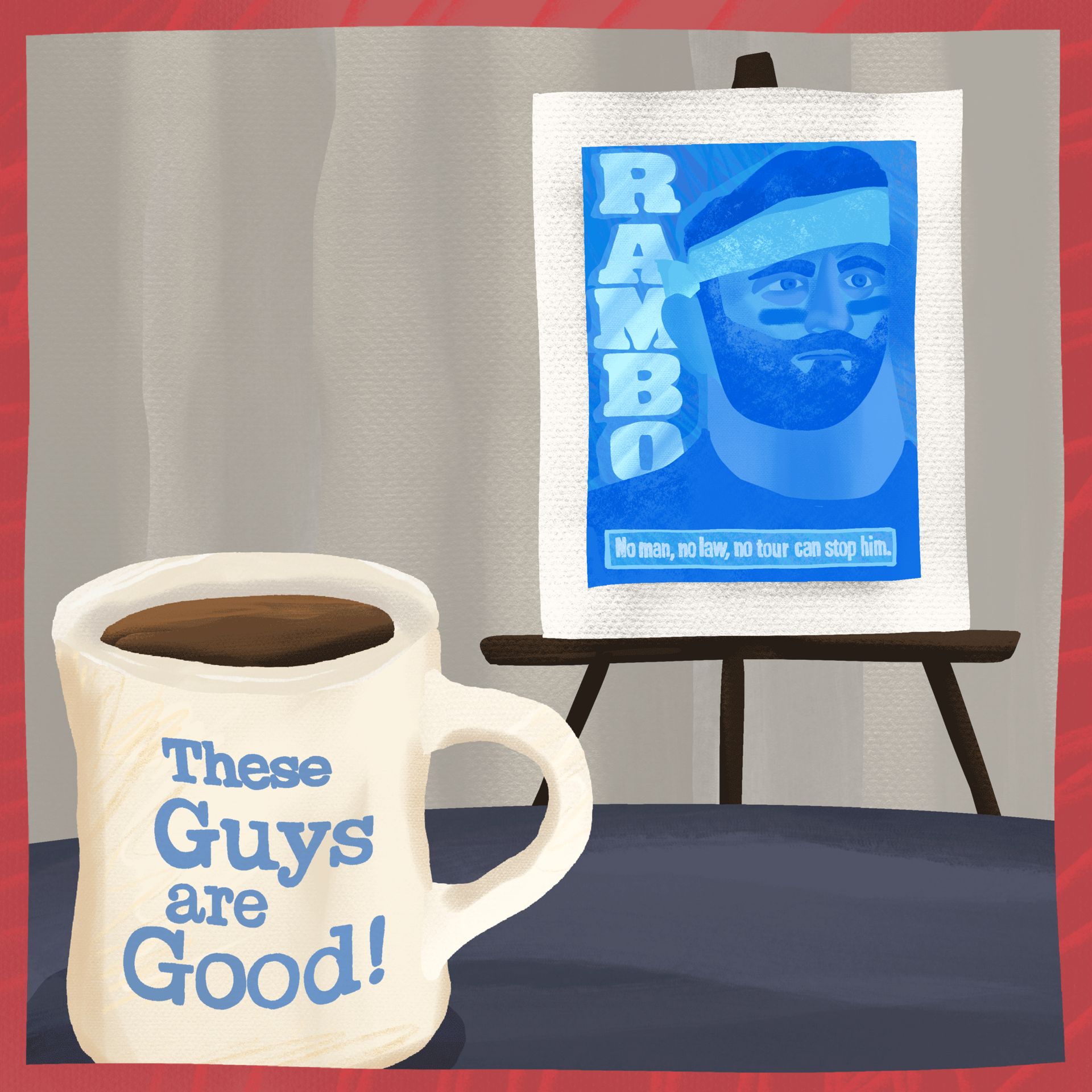
Hey PGA Tour HQ, can we get the old slogan back while you’re at it?
7. There are so many hilarious things about the specifics of this deal, but by far (?) the funniest one is that it establishes 2022-2025 as the window in which you have to have won a major or Players.
As KVV noted, this is simply the timeline in which LIV has existed. But it’s still humorous to look at 2020-2021 winners who remain ineligible.
• Collin Morikawa
• Dustin Johnson
• Hideki Matsuyama
• And … Phil Mickelson
Well that seems mighty specific.
Oh, and who’s on the board here?

Oh … wow.
[pretends to be shocked]
8. How do we feel about the punishment for Brooks (and others who want to return).
Two perspectives.
Perspective No. 1: Note that the coupons mentioned are just equity from the Tour that Brooks is not eligible to receive based on his re-entry program. Not nothing — the Tour estimates it at $50-$85 million — but also not anything material currently.
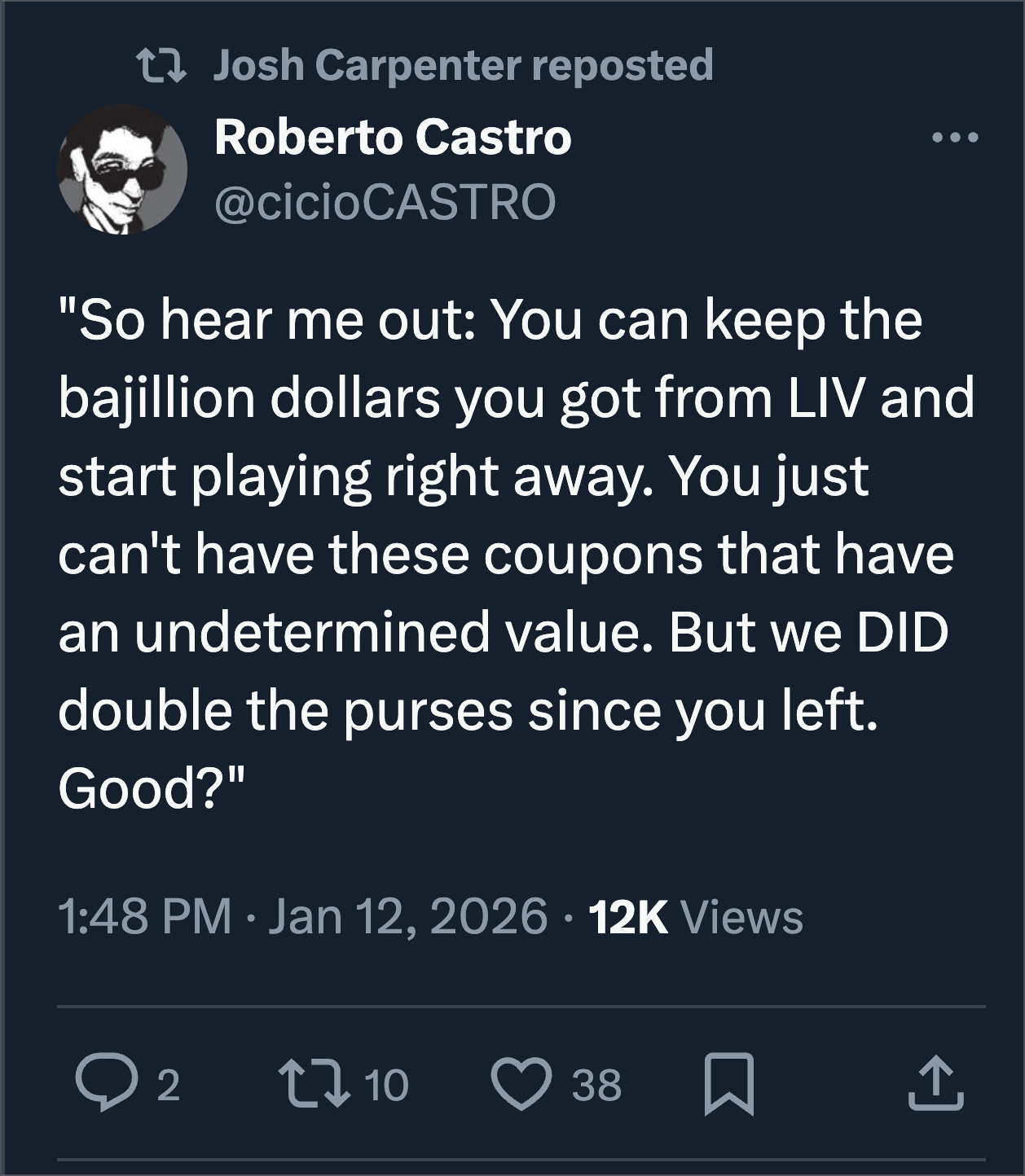
Perspective No. 2.
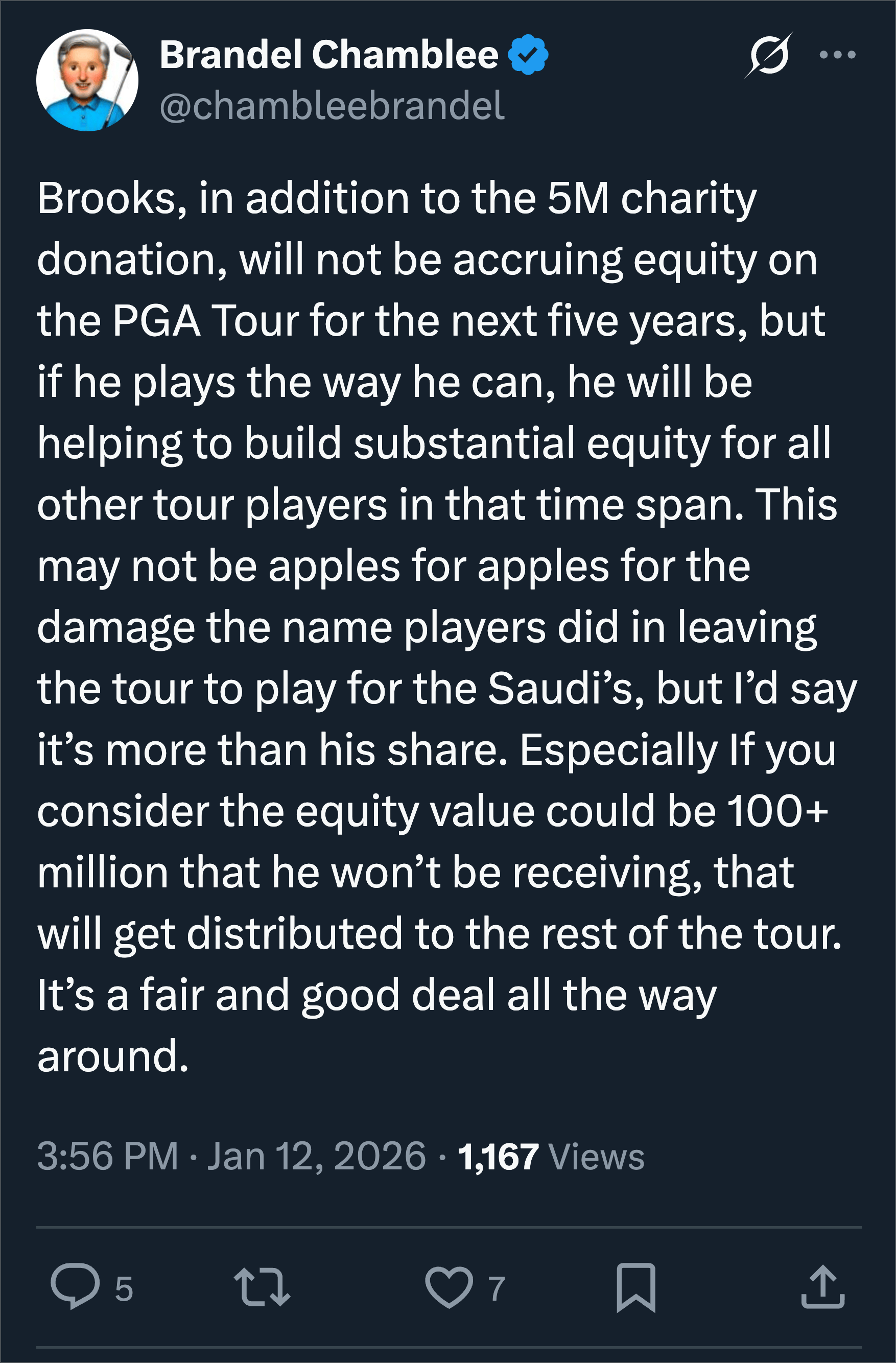
I think both are fair ways to look at it. But the right long-term view — and the one Rolapp chose — is No. 2. If there was a real threat of guys leaving again in the future, then sure, you might pick a different re-entry path.
But this is seemingly a unique situation, and Rolapp again is showing that he cares more about what fans want than what other players think.
Organizations are not fair, and money also isn’t everything.
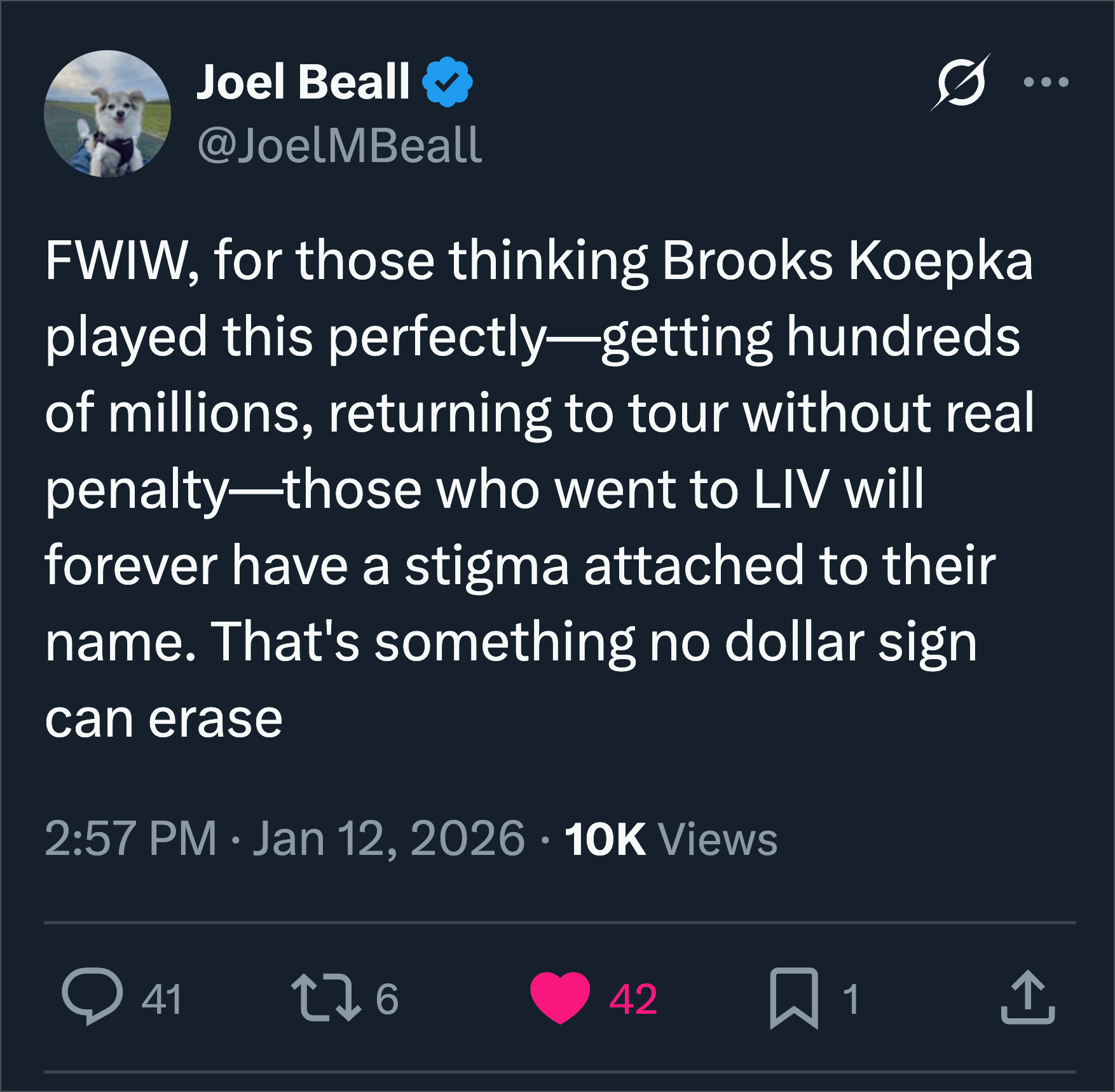
9. Are we sure Brooks is still even good at golf?
This part interests me a great deal. He was never the best day-to-day PGA Tour player, but given his major success and his relevance within the Barstool and Barstool-adjacent world, he is unquestionably an immediate top 10 draw on the Tour.
However, he may not even get into the Tour’s most important events. The Tour noted that he cannot receive a sponsor exemption into signature events and must play his way in. Is this the playing profile of someone who’s about to go on a tear on the PGA Tour?
• Age 36 season.
• DG rank: No. 159.
• Tee to green (last two years): Worse than J.T. Poston.
• Overall (last two years): Worse than Austin Eckroat.
But the majors!
Nope.
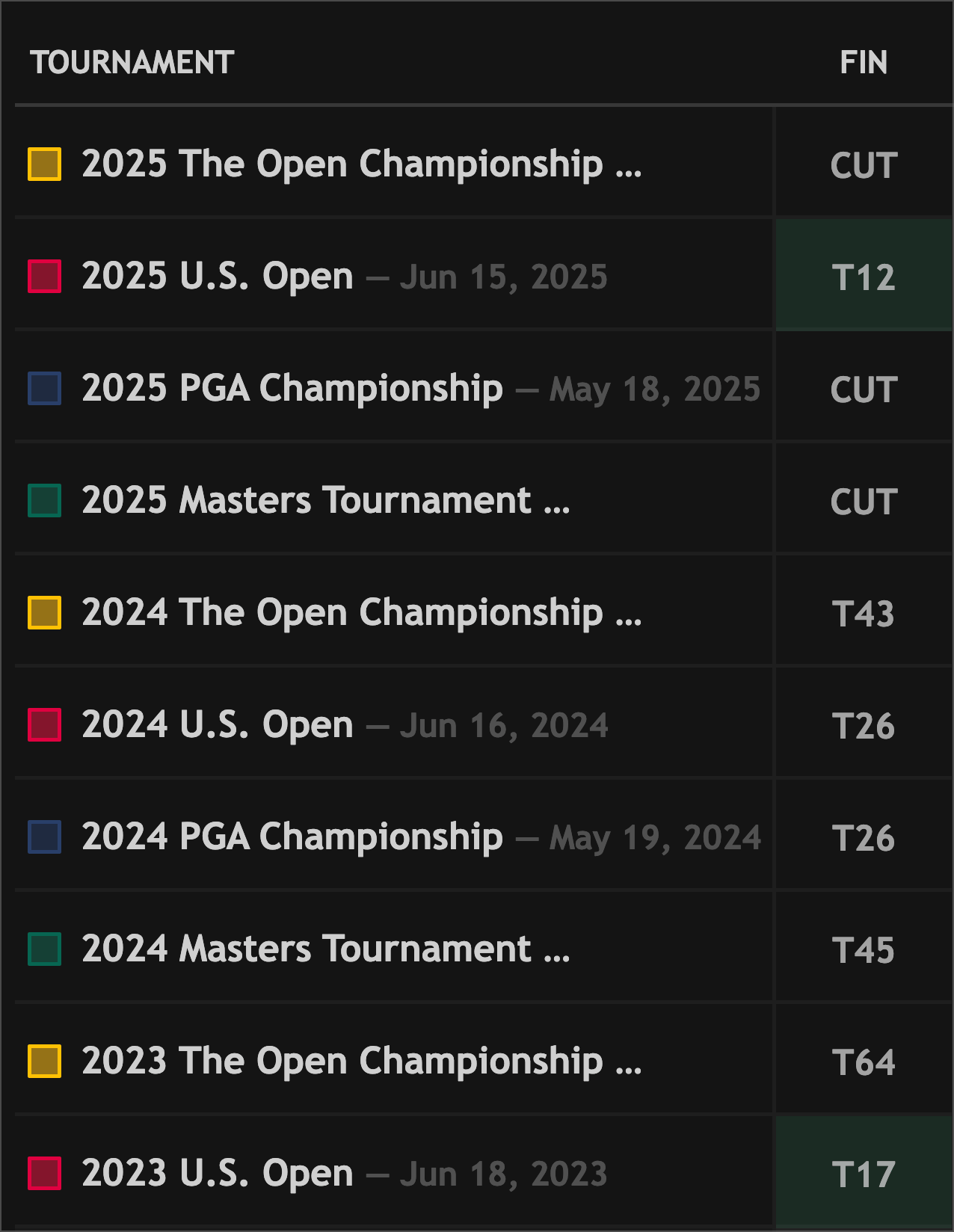
This is a coup in name only, which is all the Tour needed it to be. Though I genuinely hope I’m wrong (see point No. 11), I don’t expect Brooks to do much damage this year, especially since he’s not even in most of the Tour’s most important events.
10. A lot of greatness on Twitter today.
This from Shane is so perfectly Shane and so hilarious.
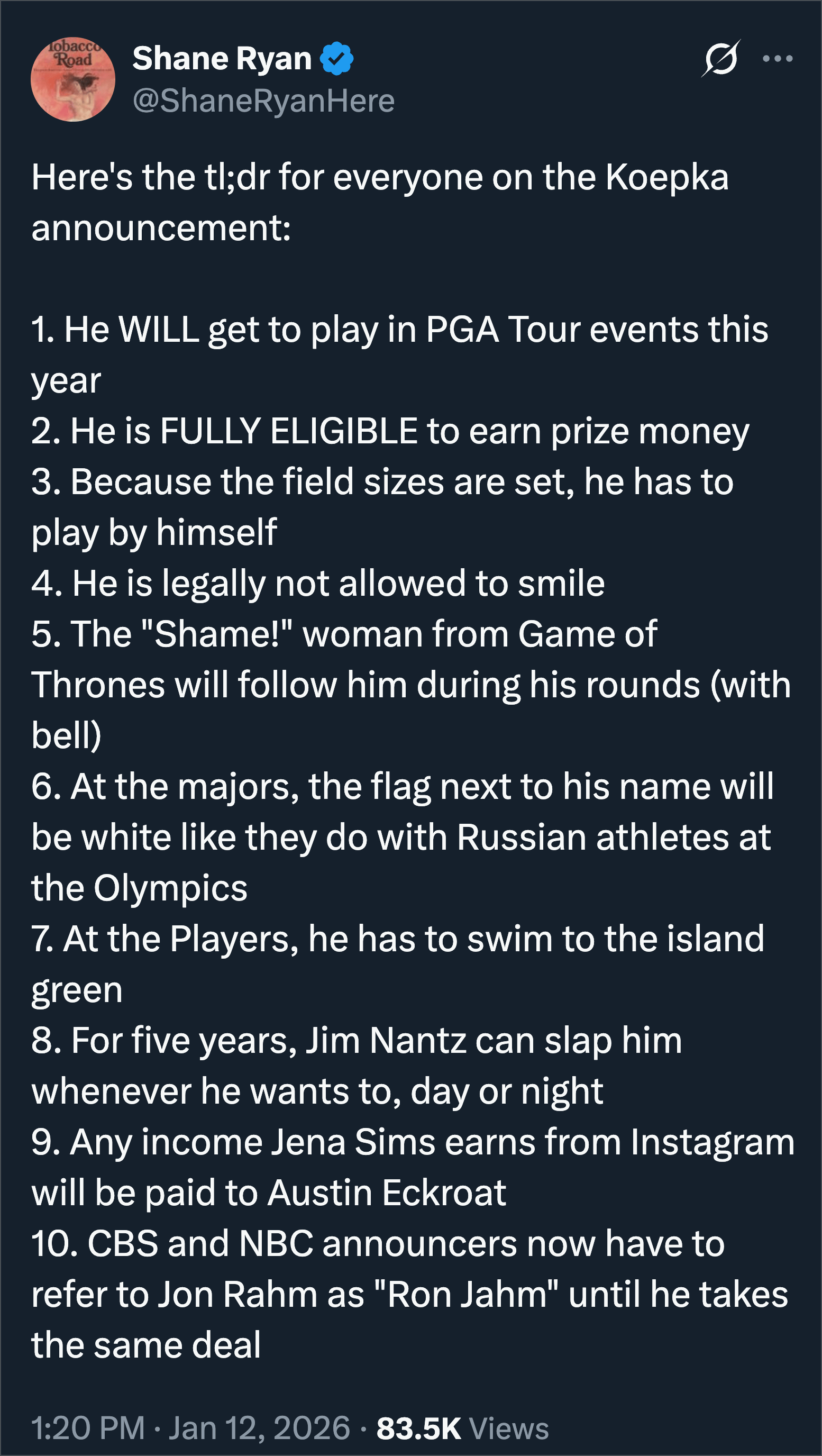
This one was amazing, too.
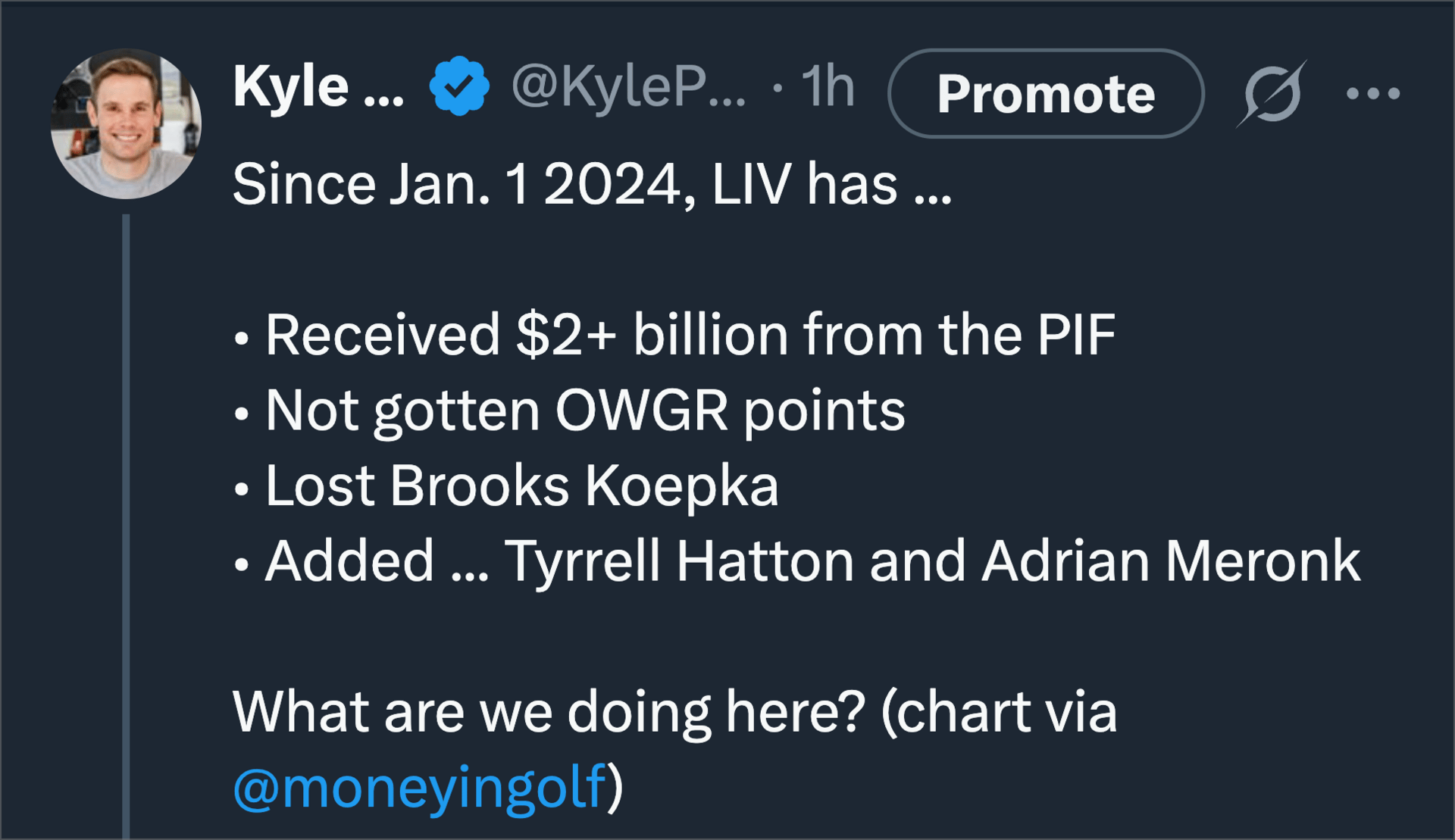
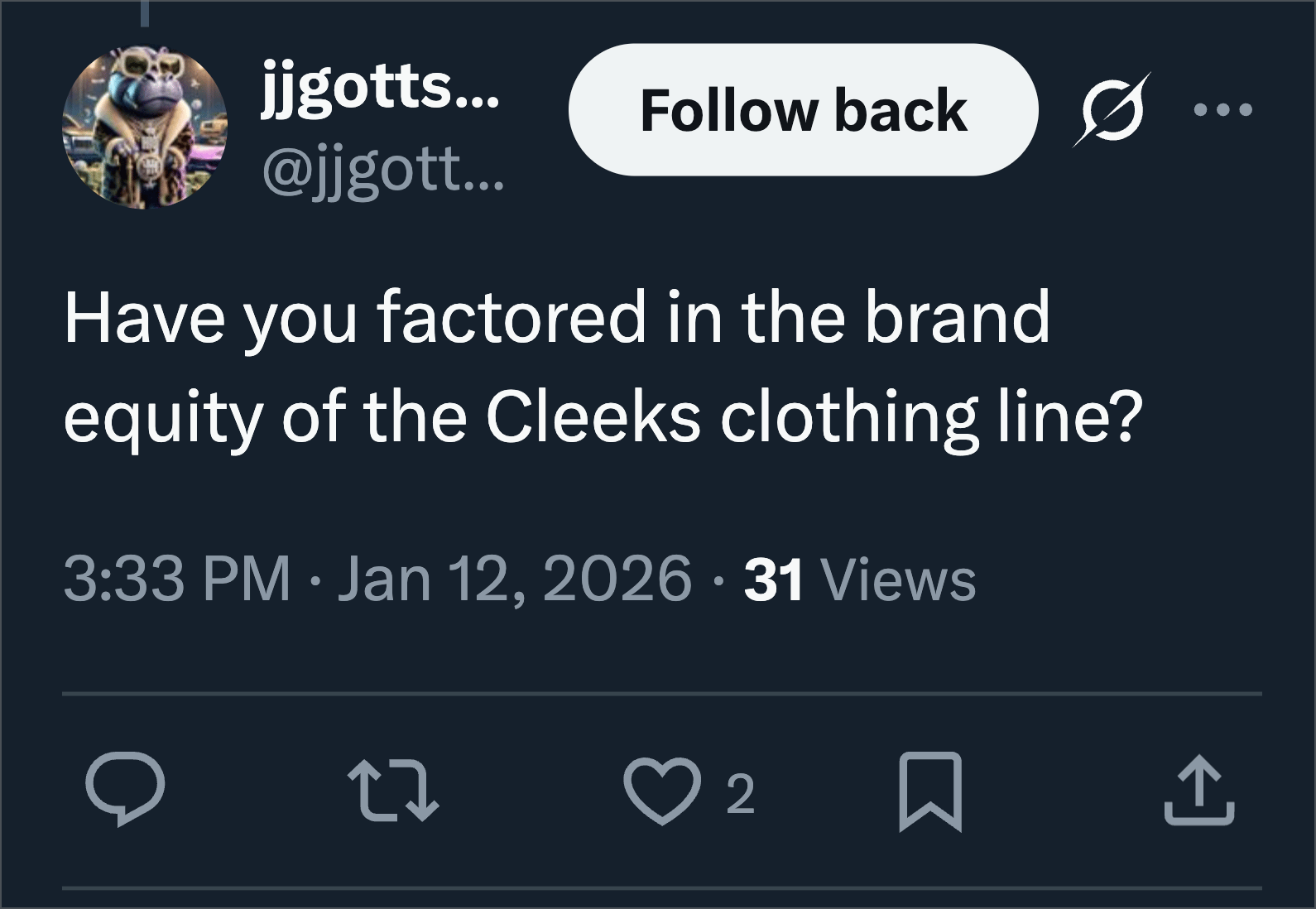
And let’s round it out with the third one that really got me.
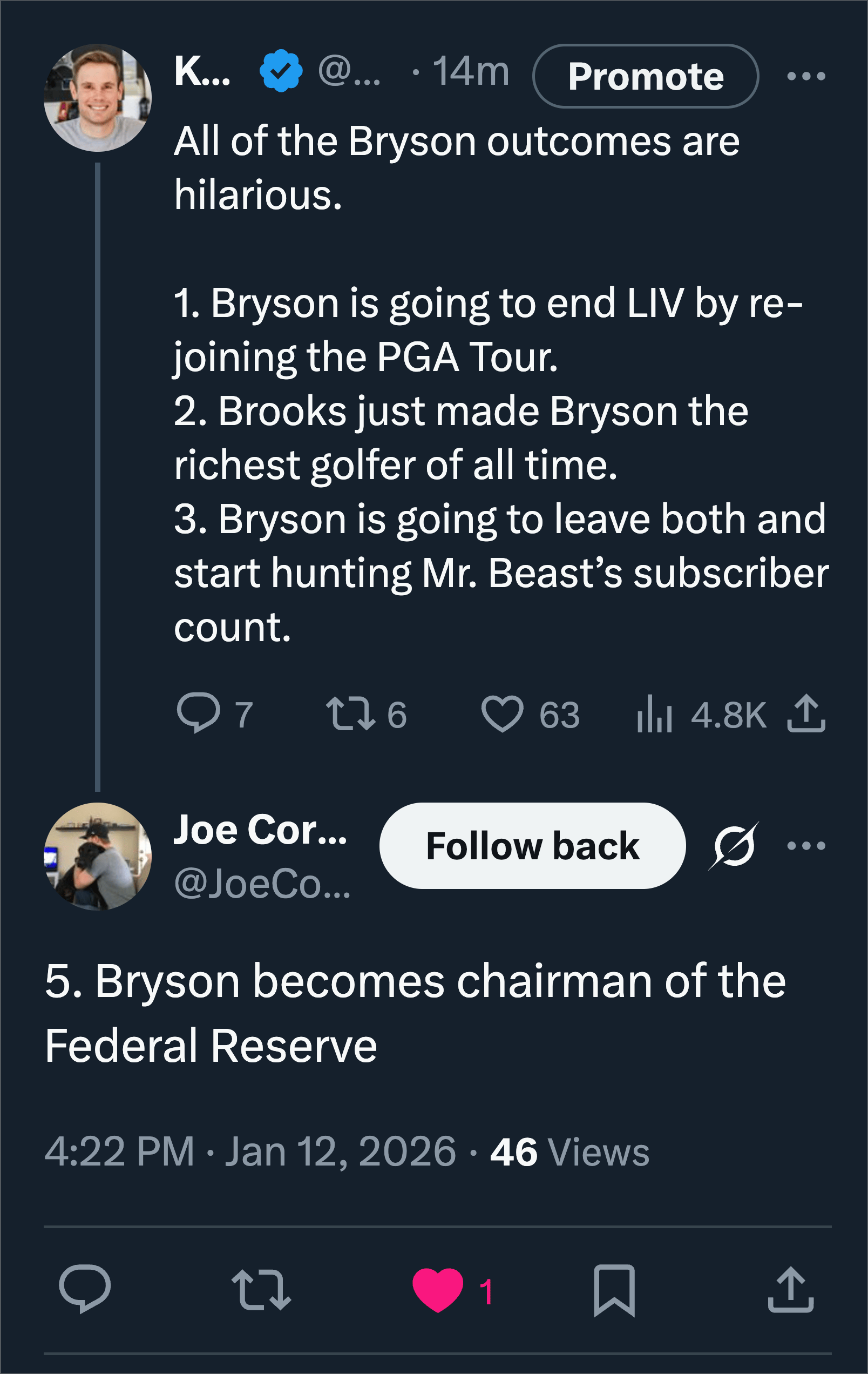
11. We’ll end here.
Brooks remains fascinating. Just when you think you have him pinned down and figured out, he shifts. One of my favorite things about this job is thinking about the people I cover. Thinking about their motivations and their desires. Thinking about why they do what they do. I’m not sure anyone is more of a paradox than Brooks Koepka.
I don’t know that I like him on a personal level, nor do I find him to be incredibly appealing as a fan favorite. But I also don’t really think any of that matters. He’s still complex and still intrigues me.
Because I believe that beneath the bad boy, “Yeah, I win majors and married a model and have more money than I can ever spend” image is someone who feels more feelings than he would ever let on and cares more than anyone would ever guess. He is a great character. One I have thoroughly enjoyed writing about and covering. One I’m quite glad is right back in the mix.
Thank you for reading our ridiculous golf newsletter. Every edition is handcrafted by me (Kyle) and Jason. It’s fantastic work that we love doing, and we appreciate you being part of the journey of trying to figure all of this out alongside us.













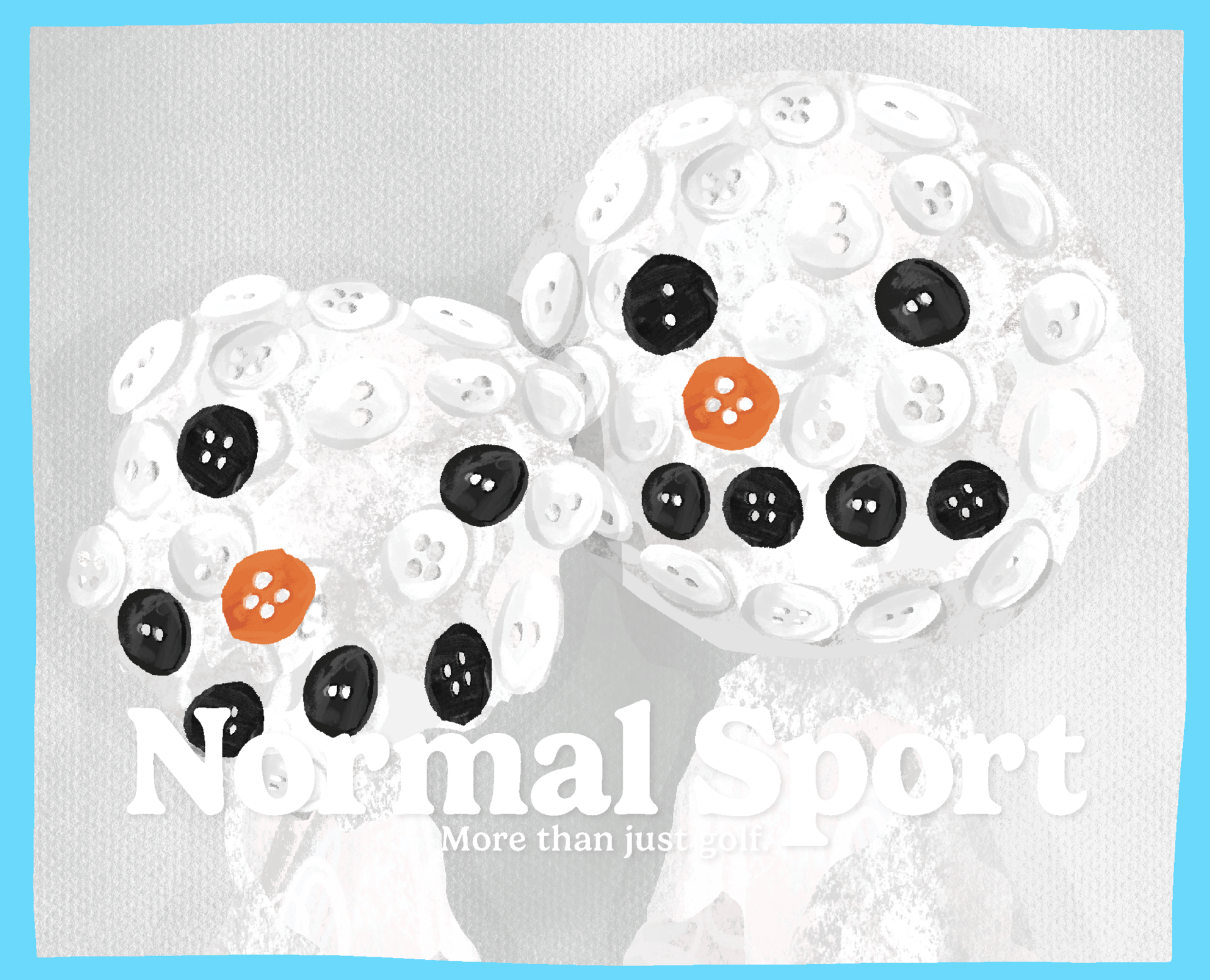
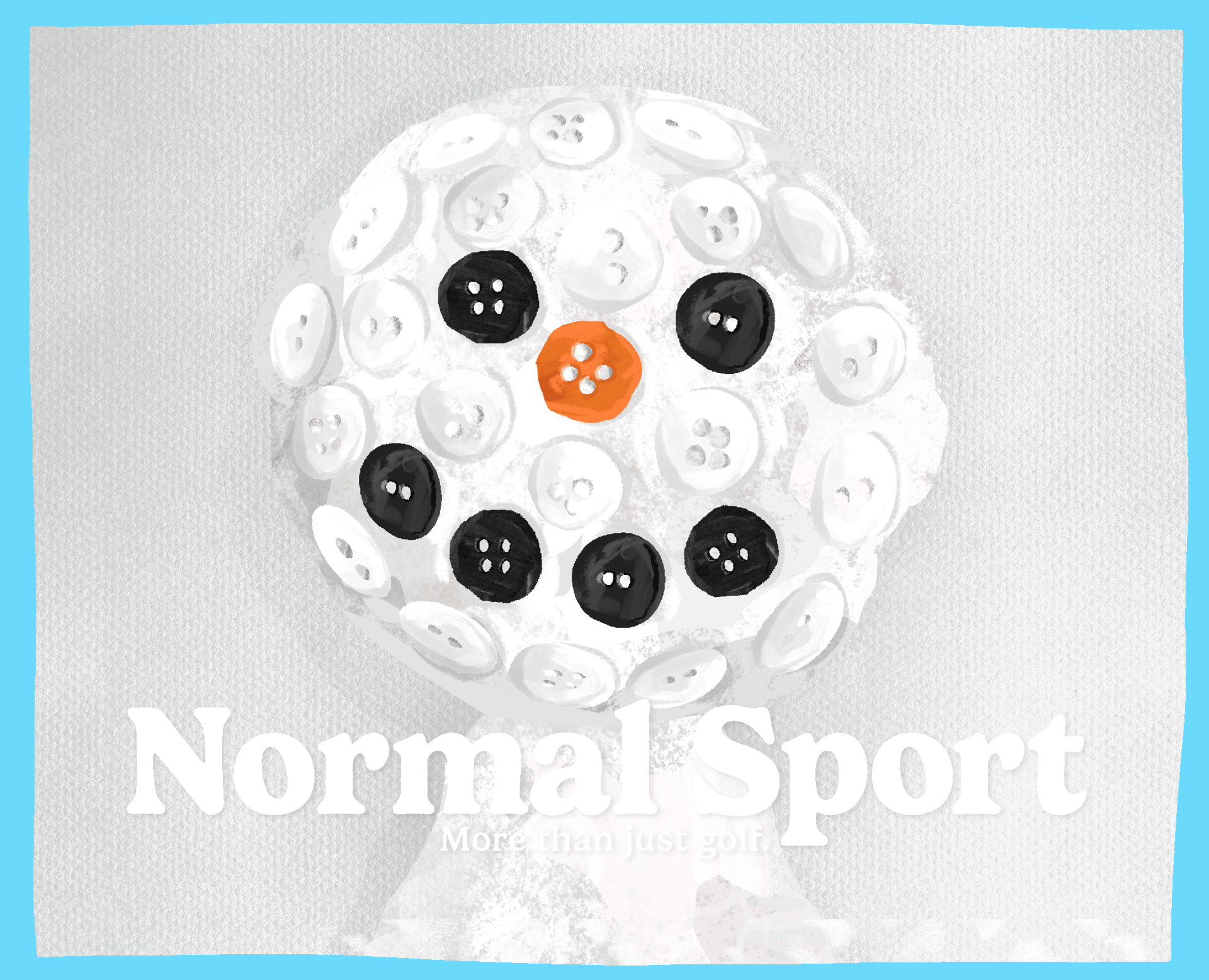
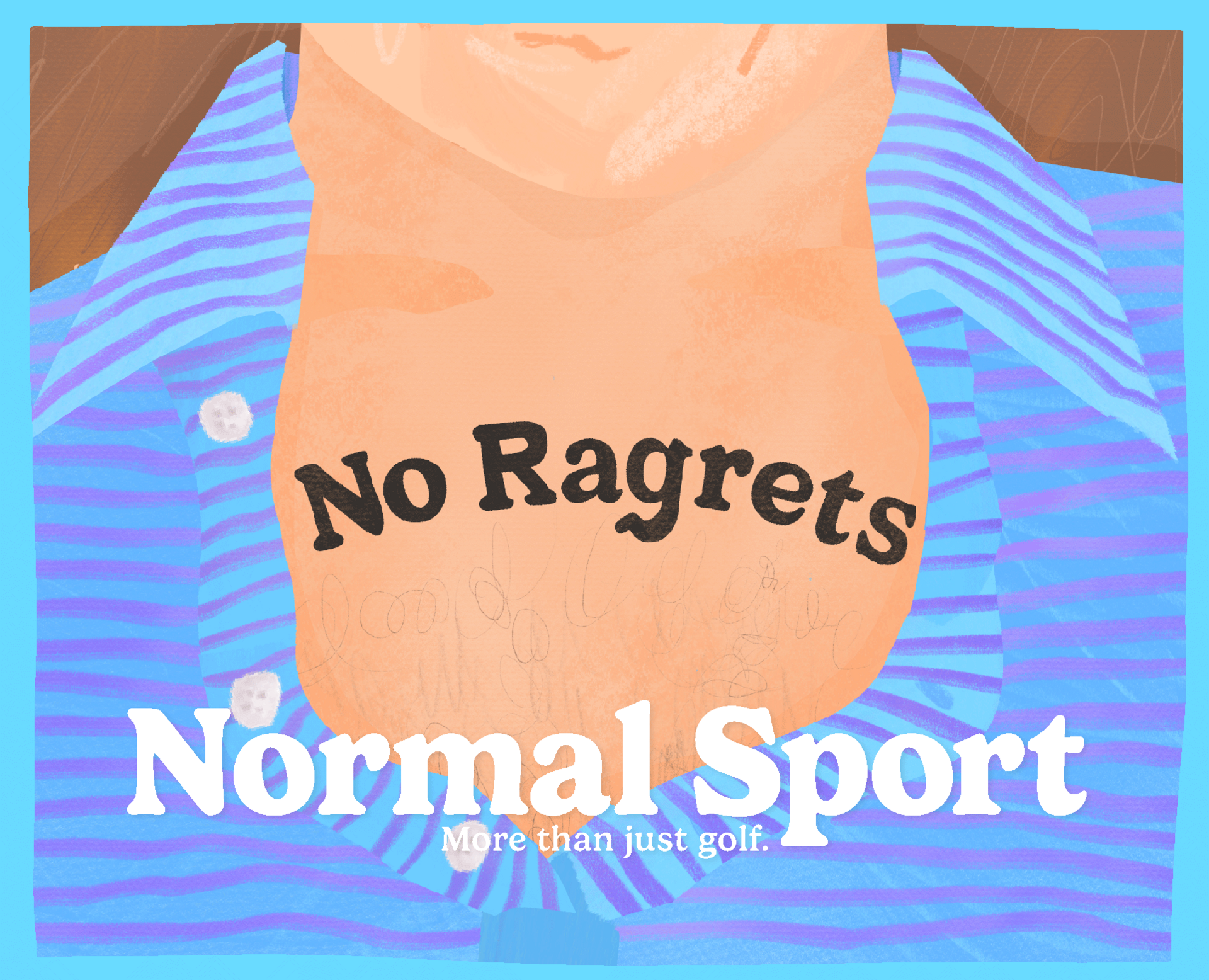
Kyle sees golf in a way that no one else does—and we're all fortunate to get to share in that view through Normal Sport!

Kyle is the best columnist in sports. That he has channeled those talents through strokes gained and Spieth memes is a blessing to golf.

Kyle's content is a product of a sick sense of humour, a clear passion for golf and unquestionable dedication to hard work. That's not normal!

Kyle is one of the best in the golf world at finding and synthesizing the absurd, the thoughtful and the fun things that make being a golf fan worthwhile.

I’ve always enjoyed your love for golf. So often I see favoritism showed to golfers in the social media world, but I enjoy reading you telling a situation how it is regardless of the person.

Kyle approaches coverage of the game with both conviction and curiosity

There’s been no one else in golf that has tickled my funny bone as often as Kyle Porter does. He’s been instrumental in ushering in a new era of golf coverage and it’s been a pleasure to be along for the ride in that.

It's a treasure trove of the important, the seemingly important, and — importantly! — the unimportant stuff. It's an asset in my inbox.

Kyle is a perfect curator of the necessary moments of levity that accent a sport that will drive most of us insane.

Few make the sport feel as fun and as thought provoking.

The way Kyle has been able to mold a silly Twitter joke (normal sport) into a must-read newsletter on the weekly happenings in our silly game gives a great look into why he's one of the smartest people in golf.

Normal Sport is exploratory, sometimes emotional, always entertaining. It also has one of my favorite writers in the biz at its foundation.











.svg)